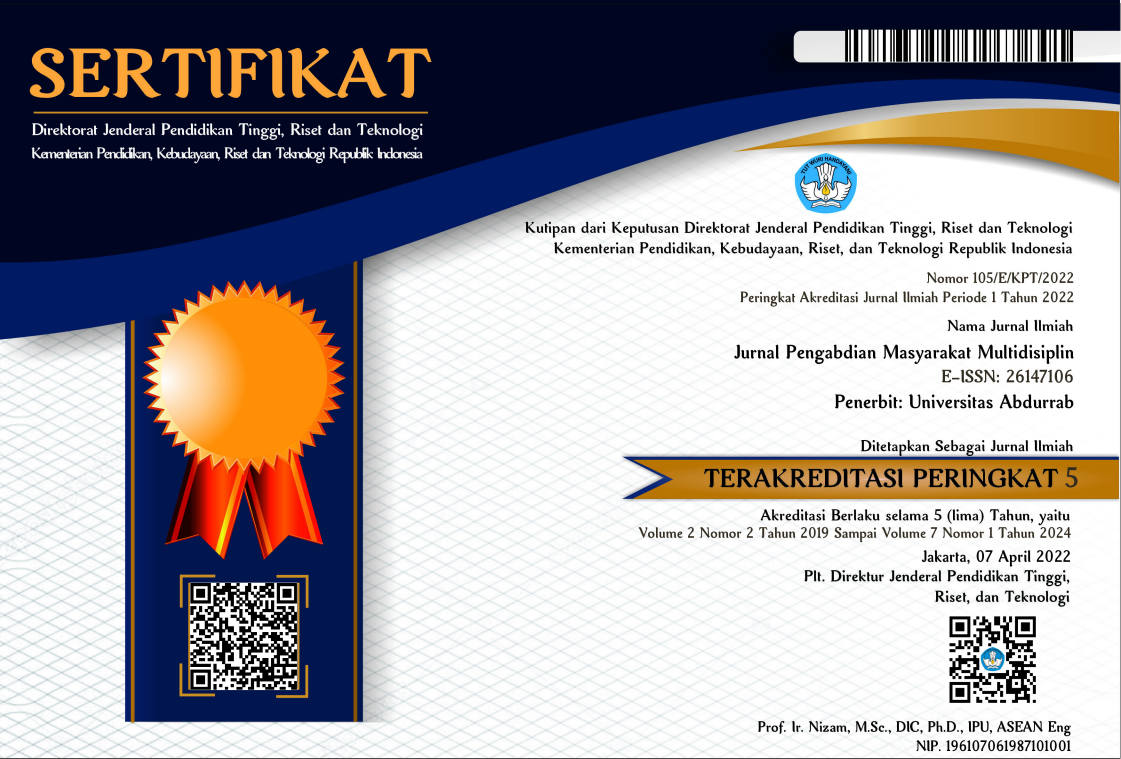PENGUATAN GERAKAN MEMILAH SAMPAH MELALUI TOKEN EKONOMI, PROMPTING DAN PSIKOEDUKASI PENGELOLAAN SAMPAH DOMESTIK
Abstract
Kampung Payung is a themed village located on Jalan LA Sucipto in Pandanwangi Village, Blimbing District, Malang City. The community's awareness and concern for waste disposal is still very low. People frequently dump garbage into rivers, and many others burn garbage, do not sort waste, and pile it up. The intervention in 2020 resulted in the formation of a community that cares about the environment and initiated the behavior of sorting waste from inside the house for 17 community members out of a total of 60 residents of RW 03. However, after two years, the behavior of sorting waste decreased and the behavior of throwing garbage in the community worsened. In 2022, community intervention aims to strengthen and improve waste sorting behavior for dasawisma members who have been sorting waste in their respective homes by using token economy, prompting, and psychoeducation methods to increase knowledge of domestic waste management and strengthen environmental care communities. The program participants were 9 women from Dasawisma Kampung Payung who were chosen based on their willingness to participate in the behavior and community strengthening program. Data collection methods include surveys, documentation, interviews, and observations. The behavior change technique uses behavior modification techniques such as economic tokens and prompting, whereas knowledge change is accomplished through psychoeducation, which is assessed via pretest and posttest. According to the findings of the intervention, economic tokens, prompting, and psychoeducation have been shown to strengthen waste sorting behavior and increase participants' knowledge of waste sorting behavior.
References
https://sipsn.menlhk.go.id/sipsn/
B. P. Samadikun, "Pengaruh Pendampingan Masyarakat dalam Pemilahan Sampah di Desa Pucung Kecamatan Tirto Kabupaten Pekalongan," Jurnal Presipitasi : Media Komunikasi dan Pengembangan Teknik Lingkungan, vol. 15, no. 1, pp. 46-52, Mar. 2018. https://doi.org/10.14710/presipitasi.v15i1.46-52
Gelbert M., Prihanto D., dan Suprihatin A. ‘Konsep Pendidikan Lingkungan Hidup dan “Wall Chart”.’ Buku Panduan Pendidikan Lingkungan Hidup. Malang: PPPGT/VEDC. 1996
Kementerian Lingkungan Hidup dan Kehutanan Republik Indonesia. “Pedoman pengelolaan sampah skala rumah tangga.” Jakarta. 2018
Nugroho, F. “Berkah mengolah sampah. Jawa Tengah” CV Sindunata. 2019.
Suseno, A., Albab, N. U., & Martadireja, S. “Manfaat pemisahan sampah organik dan anorganik melalui media buku ilustrasi anak.” Besaung: Jurnal Seni Desain dan Budaya, 5(1), 48-53. http://dx.doi.org/10.36982/jsdb.v5i1.1461 . 2020
Akhrani, L. A., Herani, I. & Hany, A. “Empowerment Community: Pembentukan Komunitas Peduli Lingkungan Sebagai Upaya Peningkatan Kesadaran.” Journal of Dedicators Community, Vol 5, 159-181. 2021
Supratiknya, A. “Merancang program dan modul.” Yogyakarta: Universitas Sanata Dharma. 2011.
Syuhada, A. R., Martha, D., & Firmansyah, M. “Pengaruh Psikoedukasi Terhadap Pengetahuan, Motivasi dan Perubahan Sikap-Prilaku” March, 1–7. (2019).
Purwanto, E. “Modifikasi Perilaku Alternatif Penanganan Anak Berkebutuhan Khusus.” Yogyakarta. Pustaka Pelajar. 2012.
Paramita, A., & Kristiana, L. “Teknik Focus Group Discussion dalam Penelitian Kualitatif.” Media Neliti, 16(2), 117–127. https://doi.org/10.22435/bpsk.v16i2 2013.
Rachmawati, I. N. “Pengumpulan data dalam penelitian kualitatif: Wawancara.” Jurnal Keperawatan Indonesia, 11(1), 35–40. https://doi.org/10.7454/jki.v11i1.184 2007.
Moleong, L., J. “Metodologi Penelitian Kualitatif.” PT Remaja Rosdakarya, Bandung 2010.
Fadhallah, R. A. “Wawancara.” UNJ PRESS. 2021.
Kristanto, V. H. “Metodologi Penelitian Pedoman Penulisan Karya Tulis Ilmiah (KTI).” Yogyakarta: CV Budi Utama. 2018.
Yusuf, A. M. “Kuantitatif, Kualitatif, & Penelitian Gabungan.” Jakarta: Kencana. 2014.
Azwar, S. “Metode penelitian psikologi”. Edisi II. Yogyakarta: Pustaka Pelajar. 2017.
Martin, G., & Pear, J., J. “Behavior modification: Principles & procedure”. 5th ed. 2015.
Miltenberger R. G. “Behavior modification : principles and procedures”. 5th ed.. Wadsworth Cengage Learning. 2012.
Sokhivah. “Evaluasi dan indikator keberhasilan program intervensi sosial untuk perubahan.” Khidmat Sosial: Journal of Social Work and Social Services Vol. 2 No. 1 April 2021 pp.1- e-ISSN 2721-6918 . 2021
Walsh, Joseph. “Psycheducation In Mental Health.” Chicago: Lyceum Books, Inc. 2010.
Siswoyo, S. “Pengaruh psikoedukasi terhadap pengetahuan, intensi, dan sick role behaviour pada pasien katarak dengan pendekatanmodel theory of planned behaviour ajzen.” Journal of Nursing Science Update, 3(2), 198-210. 2015.
Erlyani, N., & Zwagery, R. V. “Efektivitas Psikoedukasi Perilaku Pro-Lingkungan Untuk Meningkatkan Pengetahuan Tentang Pelestarian Sungai Bagi Siswa SDN Pekauman 1 Martapura Timur, Kabupaten Banjar.” Prosiding Seminar Nasional Lingkungan Lahan Basah, 525–530. 2018.
Erviana, V. Y., Suwartini, I., & Mudayana, A. “Pengolahan Limbah Minyak Jelantah dan Kulit Pisang Menjadi Sabun." Jurnal SOLMA. https://doi.org/10.29405/solma.v7i2.2003. 2018.
Sundoro, T., Kusuma, E., & Auwalani. “Pemanfaatan Minyak Jelantah Dalam Pembuatan Lilin Warna-Warni.” Jurnal Pengabdian Masyarakat Ipteks (Vol. 6, Issue 2). 2020.
Zwageri, R. V., & Leza, N. M. “Efektivitas teknik token economy dalam meningkatkan perilaku membuang sampah pada tempatnya di SDN Mekar Martapura Timur.” Mind Set, 11(2), 129-138. https://doi.org/10.35814/mindset.v11i02.1477 .2020.
Corey, G. “Theory and practice of counseling and psychotherapy.” Brooks/Cole Cengage Learning. 2013.
Ahmadi, A. “Psikologi perkembangan.” Jakarta: Rineka Cipta. 2005.
Sarafino, E. P. “Applied behavior analysis: Principles and procedures for modifying behavior.” USA: John Wiley & Sons, Inc. 2012.
Elga, Andina. “Analisis Perilaku Pemilahan Sampah di Kota Surabaya.” Aspirasi: Jurnal Masalah-Masalah Sosial. Volume 10, No. 2 Desember 2019ISSN: 2086-6305 (print) ISSN: 2614-5863 (electronic)DOI: https://doi.org/10.22212/aspirasi.v10i2.1424link online: http://jurnal.dpr.go.id/index.php/aspirasi/index. 2019.
Sokiyah. “Token ekonomi sebuah tips pembiasaan perilaku positif di smp negeri 8 kota Jambi.” Jurnal Gentala Pendidikan Dasar, 4(1), 107-121. https://doi.org/10.22437/gentala.v4i1.6883 .2019.
Madani, M. In picture: “Kampung payung, destinasi wisata tematik yang baru di Malang.” Republika.id. Dikutip 2022, Juli dari https://www.republika.co.id/berita/ozcxf9283/kampung-payung-destinasi-wisata-tematik-yang-baru-di-malang . 2017.
Kelurahan Pandanwangi. “Profil kelurahan Pandanwangi.” Kelpandanwangi.malangkota.go.id. Dikutip 2022, Juli dari https://kelpandanwangi.malangkota.go.id/2022/06/21/penyerahan-bpnt-d-untuk-287-kpm-kelurahan-pandanwangi/ . 2021.

This work is licensed under a Creative Commons Attribution-NonCommercial-ShareAlike 4.0 International License.
1. Copyright of all journal manuscripts is held by the Jurnal Pengabdian Masyarakat Multidisiplin.Formal legal provisions to access digital articles of electronic journal are subject to the provision of the Creative
2. Commons Attribution-ShareAlike license (CC BY-NC-SA), which means that Jurnal Pengabdian Masyarakat Multidisiplin is rightful to keep, transfer media/format, manage in the form of databases, maintain, and
3. publish articles.Published manuscripts both printed and electronic are open access for educational, research, and library purposes. Additionally, the editorial board is not responsible for any violations of copyright law.
licensed under a Creative Commons Attribution-ShareAlike 4.0 International License.
 PDF (Bahasa Indonesia)
PDF (Bahasa Indonesia)
 Abstract views: 360
Abstract views: 360
 downloads: 275
downloads: 275

 :
:




